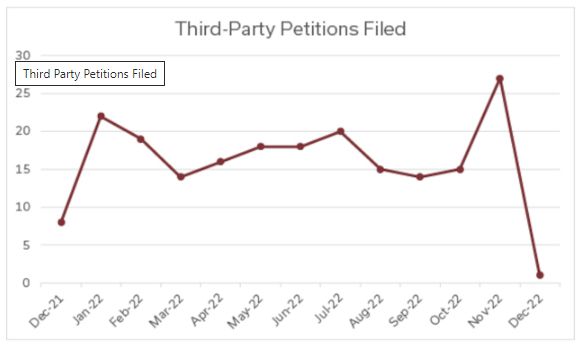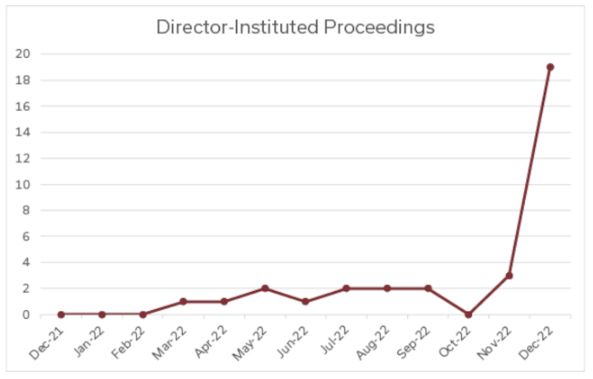- in United States
- with readers working within the Law Firm industries
- within Energy and Natural Resources and International Law topic(s)
The Trademark Modernization Act (the "TMA"), which went into effect in December 2021, allowed for two new procedures - "expungement" and "reexamination" - for cancelling deadwood trademark registrations. For more on the Trademark Modernization Act, and the details on the expungement and reexamination procedures see here.
This article provides a year-in-review of the TMA - the number of expungement/reexamination petitions filed and their results, and the effectiveness of the new procedures.
Filing Data
After one year, there have been 207 total third-party petitions filed - 105 expungements and 102 reexaminations. There have been 33 Director-instituted proceedings.
With the exception of December1, petitions filed by third-parties have been relatively consistent month-to-month, ranging from 14 to 27 filings in each month in 2022. The chart below shows the month-over-month trend in third-party expungement and reexamination filings brought under the TMA.

Director-instituted proceedings, on the other hand, have been anything but consistent. After instituting no proceedings from December, 2021 through February, 2022, the Director instituted only 14 proceedings over the next nine months before instituting 18 proceedings on a single day on December 14, 2022.

As we move into 2023, it will be worth following whether third-party filings stay relatively steady, and whether the Director continues the December practice of bulk-instituting.
Institution Determination
After a third-party petition has been filed, the USPTO must determine whether the petitioner established a prima facie case of non-use of the mark. The USPTO has three options:
- If the USPTO determines that petitioner has established a prima face case of non-use after a comprehensive investigation, the USPTO may institute a proceeding and issue a nonfinal office action. The registrant has three months from the issue date of the nonfinal office action to respond or request a one-month extension of time to respond.
- If the USPTO determines that petitioner has not established a prima facie case of non-use, the USPTO may choose not to institute a proceeding. The determination of whether to institute an expungement or reexamination proceeding is final and non-reviewable.
- If the USPTO believes a petition is incomplete or missing evidence, the USPTO may issue a Petition Inquiry Letter. Upon receiving a Petition Inquiry Letter, the petitioner has 30 days to respond to remedy the concerns raised by the USPTO.
Results
. Third-party initiated proceedings
Approximately 34% of all third-party proceedings were not instituted because the petitioner failed to establish a prima facie case. Specifically, the USPTO has instituted 118 third-party filings and refused to institute 61. One common reason the USPTO refused to institute a proceeding was that the petitioner failed to set forth a prima facie case because the investigation related to use was not appropriately comprehensive. For example, the USPTO has refused to institute a proceeding where the submitted evidence consisted of: Google search results, Amazon search results, screenshots from YouTube and LinkedIn2; two affidavits alleging non-use3; website captures from www.gov.uk and an article from World Trademark Review4; and screenshots from the registrant's own website5. Based on the results we are seeing from 2022, it appears that the petitioner's burden to conduct the investigation is higher than initially expected. Because the determination not to institute a proceeding is final and non-reviewable, petitioners should take the time to establish a prima facie case before filing a petition.
Of the 118 third-party proceedings that have been instituted, the registrant has successfully established use only 4 times, though there are many proceedings still pending in which the registrant has filed a response and the USPTO has yet to reach a decision.
Of the 118 third-party proceedings that have been instituted, 29 registrations have been cancelled, in whole or in part, because the registrant failed to timely respond to an office action. 3 registrations were voluntarily surrendered, in whole or in part. 12 of the 29 cancelled registrations did not have a listed U.S. attorney of record. This highlights the importance of having a U.S. attorney of record, and maintaining a current and regularly monitored email address on record, to receive correspondence from the USPTO and respond in a timely manner. The remaining proceedings are still pending either because they have not been examined or because registrants who filed responses have not yet had the proceeding decided on the merits.
. Director-instituted proceedings
A similar trend can be seen with Director-instituted proceedings. Of the 33 Director-instituted proceedings, 7 were cancelled in whole or in part because of a failure to respond, and 1 was voluntarily surrendered. The remainder are still pending.
In 2023, it will be worth closely monitoring whether the registrants who filed responses to the notices of institution (which passed the USPTO scrutiny) will be able to maintain their registrations.
Footnotes
1 Only one third-party reexamination petition was filed in the month of December, on December 2 against THE RUCKER (U.S. Reg. No. 6749864).
2 Pet. No. 2022-100029 for AIMTECH (U.S. Reg. No. 5095010)
3 Pet. No. 2022-100030 for Misc. Design (U.S. Reg. No. 4990946)
4 Pet. No. 2022-100039 for STRATOSPHERE (U.S. Reg. No. 5646212)
5 Pet. No. 2022-100087 for TOMORROW (U.S. Reg. No. 5024526)
The content of this article is intended to provide a general guide to the subject matter. Specialist advice should be sought about your specific circumstances.


